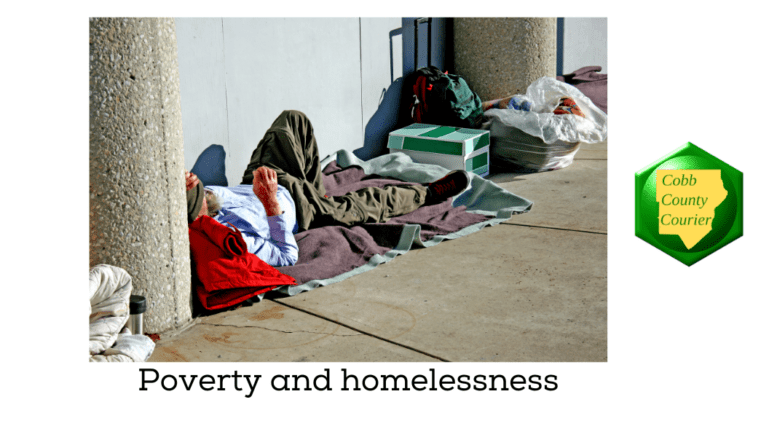By Drew Preston Johnson
A woman brought her child with her to class, which is not what they are supposed to do.
But for whatever reason, he was there, and he was a handful.
Throughout the life skills class, he was screaming out occasionally, gradually getting louder. At
a certain point, each response from his mother became yelling to shut up, with each time getting
more aggressive. Such a display wasn’t typical, but it also wasn’t unusual for the setting.
Their teacher, Kelly Whitehead, played a video and went to the back of the room. The boy came
walking up toward her. They began drawing together until he became upset when she had to
return to teaching the class. She held his hand and took him up to the front of the room and gave
him a marker to write on the whiteboard while she spoke.
“I teach the women about conflict management,” said Whitehead, an active volunteer at The
Atlanta Mission for the last 10 years. “How to fight well, manage your self-esteem and manage
relationships. Many of these women did not grow up in healthy homes. They did not grow up
learning how to raise children right.”
Whitehead was an elementary teacher but now spends most of her time volunteering at The
Atlanta Mission to teach and to lead a community support group for women called The Circle of
Sisters. The class is for a program operating out of the new trauma-informed care facility called
The Restoration House in downtown Atlanta.
Mothers with children are not what people normally imagine when thinking about the issue of
homelessness. While this subset of the homeless population is more hidden and less likely to
make signs than men, they all still face the same fundamental problem.
A study in the summer of 2022 showed that the number of homeless people in Atlanta had
decreased by 38% since 2020, with only 2,017 homeless people counted on the streets. Even
with encouraging statistics like this, the pervasive issue of homelessness seems like a problem
that will never go away. So, what can be done? What is the best way to put people on the best
course to change their lives?
Volunteers and full-time employees at the Atlanta Mission have spent countless hours working
with people in need and this has led them to see the issue more clearly.
The city of Atlanta allocated $65 million for housing and homelessness in the 2023 budget.
“What the government can do for people is create a dependency on the money that they can give
Johnson and that’s all they have to offer,” Jim Reese, former President of The Atlanta Mission, says. “But what we could do as a ministry was give them hope and truthfully hope for a different life.”
The Atlanta Mission has several programs and locations across the metropolitan city area
dedicated to both men and women with their children. The Restoration House has one such
program where women and their children can stay for 30 days and have the choice to join a
longer program at the My Sister’s House location. This includes job skill classes, consistent
medical aid and shelter to eventually transition back into a stable environment for both the
mother and the children.
Jennifer Hutchinson has worked full-time at The Restoration House for the last 19 years and two
years ago she was made the Campus Director. She says that one of the biggest challenges of her
job is changing the survival instincts of people.
“They’re looking at, ‘how do I survive for the next 24 hours’ while we’re looking at, ‘how can you be successful for the rest of your life’,” she says. “They’re not realizing that taking the year to work on themselves will benefit you for so many more years to come down the road.”
Hutchinson consistently pours her compassion and care into the dozens of women and children
who seek help on a weekly basis. Many counselors, volunteers, and sponsors can help the clients
within the 30 days that they are there, but most of the time it comes down to her to decide
whether someone is fit for the program. She says that the hardest part of her job is realizing that
she can’t work to improve people if they don’t want it for themselves.
“Something at the forefront of my mind is how I never know if this is the last time I’m going to see someone. I could come in tomorrow and they could be gone,” said Hutchinson.
Hutchinson says what motivates her the most is how “because we’re a Christian organization we
can represent Christ and pursue the clients the same way that Christ pursues us, which to me
means Christ didn’t give up on us the first time we didn’t get it. He keeps coming after us with his
love and his kindness as well as his accountability.”
Bernita Bogan has been homeless for the last two years and only recently has gotten back on her
feet. She says that for most people like her, “it comes down to trust, because they’ve been burnt
so many times in their lives by people who should have been there for them. When you have nice
caring people that are saying, ‘we care about you we have your best interest in mind’ that’s a
foreign concept to them.”
Jim Reese talks of the importance of understanding what people truly need.
“We think they need financially and they’re screaming about what they need relationally,” he says. “We see somebody who has no shoes, so we buy them a pair of shoes thinking we’ve just done this great thing for
them. But if they were honest with us, which they usually won’t be, they would say the last thing
I needed was a pair of shoes. You saw that I needed them because it’s what we would get if it
was us. We put ourselves in their place without understanding what their place is.”
The Atlanta Mission is a faith-based nonprofit organization that has been fighting the war on
homelessness in Atlanta since 1947. The organization has several programs and locations across
the metropolitan city area dedicated to both men and women with their children.

Drew Preston Johnson is a Public Relations student at Kennesaw State University
